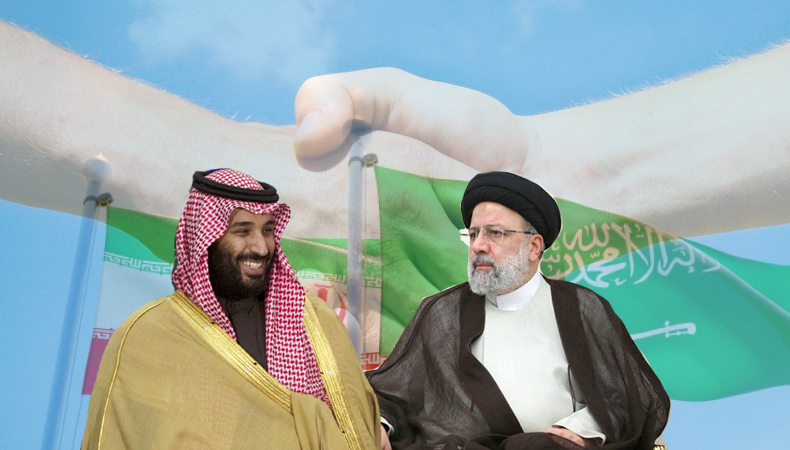Iran Gets Cozy With Saudi Arabia to Strengthen Diplomatic Relations Amid Domestic Unrest

Iran and Saudi have let their past rivalry be bygones as they work towards starting their relationship afresh. The two countries agreed to restore ties after China brokered talks. Representatives of Iran and Saudi Arabia held meetings secretly for five days in Beijing, in March.
Also Read – Iran’s Strategy: From Ties to Saudi Arabia to Plotting Against Israel
The Kingdom of Saudi Arabia severed diplomatic ties with Iran after protesters attacked its embassy in Iran following the execution of Shiite cleric Nimr al Nimr in January 2016. The two countries also clashed over regional conflicts in Syria and Yemen. Relations took an ugly twist when Riyadh opposed Iran’s nuclear and ballistic missile ambitions.
Relations began to flourish in 2021 when Iraq began a sporadic dialogue between the two countries. Oman also helped facilitate diplomacy. But Saudi Arabia and Iran failed to reach an agreement, between April 2021 and April 2022, in five rounds of talks. Then China intervened and succeeded too. While the West raised eyebrows at China’s role, a new era has begun – the rising dominance of Middle East countries.
Importance of Fostering Good Relations
Iran’s foreign minister Hossein Amir-Abdollahian said the return of normal relations with KSA provides great capacities to the two countries, the region and the Islamic World. He believes they are moving in the right direction, with diplomatic apparatus actively preparing for more regional steps.
Tehran has recognized the importance of fostering stronger ties with its Middle Eastern neighbors. By leveraging their shared economic interests and exploring opportunities for cooperation, Iran aims to bolster its economic resilience and ensure a sustainable path to growth. Iran has been caught up in a domestic uprising for nearly a year now, and recognizes the need to project stability externally and develop favorable regional alliances.
By refreshing relations with Saudi Arabia, it hopes to gain diplomatic support and potentially influence the outcome of the crisis. However, this delicate balancing act carries the risk of exacerbating internal tensions and invite further scrutiny from Western governments.
China Close to Heart
Marcus Schneider, head of FES MENA – Regional Peace and Security Project in Beirut, said its Iran’s success, an opportunity to step out of international isolation amid worsening relations with the U.S. and other West nations. He highlighted that China’s relations with the West is also deteriorating. But having refreshed relations between Saudi Arabia and Iran, gives it leverage. The expert said it serves Iran’s interests that it pushed the U.S. out of the region and reduces Washington’s influence.
Saudi foreign minister Prince Faisal bin Farhan al-Saud defended the Kingdom’s links with China saying that the Asian giant was their largest trading partner. He said China is an important and valued partner in many areas. Riyadh and Beijing have excellent working relationships across several sectors. The minister said Saudi Arabia will always look towards its own interests, whether it’s in the west or east.
Israel’s Concerns
Israeli Prime Minister Benjamin Netanyahu warned Saudi Arabia that those who partner with Iran partner with misery. He gave the examples of Yemen, Syria and Iraq. Netanyahu believes 95 percent of the problems in the Middle East is because of Iran. The Israeli PM told CNBC that the deal between Riyadh and Tehran might be to de-escalate the long-standing conflict in Yemen.
Also Read – Gallant tells Austin that Iran’s Middle Eastern proxies attack Israel
It should be noted that Israel is also desperate to establish good ties with Saudi Arabia. US Secretary of State Antony Blinken tried to encourage a peace deal between the two countries, which was started off by the Trump administration. He said a collective, prosperous, stable region serves the interests of Israel and U.S’s Middle East relations.




